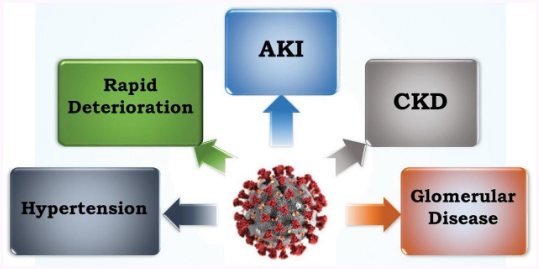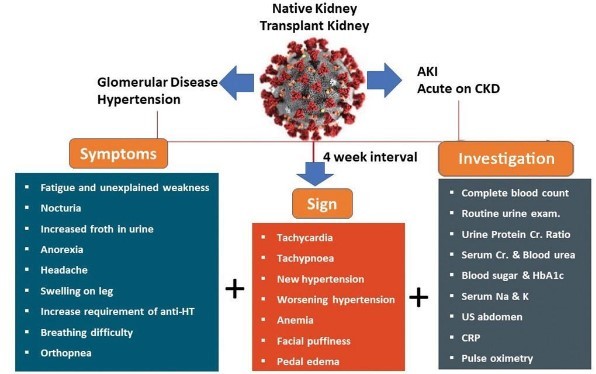Post-COVID nephrology related conditions: MoHFW guideline updates
M3 India Newsdesk Mar 15, 2022
There are several nephrological conditions that are observed as a consequence of COVID infections. Discussed in this part of the series of COVID sequelae are the common nephrological conditions and their recommended management.
Key takeaways
- Acute kidney injury (AKI) is an independent predictor of mortality and poor outcomes in COVID-19 patients.
- It is important to note that often there are no symptoms/ signs of Post-COVID-19 related nephrological problems and patients are asymptomatic.
- If a Post-COVID patient is diagnosed with nephrological sequelae, he should be managed at a health care facility having the support of a Nephrologist and there should be access to dialysis services.
Common nephrological complications associated with post-COVID
The following are the most frequently occurring renal problems associated with COVID:
- AKI in native kidney or transplant kidney
- Rapid progression of pre-existing CKD in native kidney or transplant kidney
- Progression of CKD to End-Stage Kidney Disease (ESKD) in native kidney or transplant
- kidney
- New-onset glomerular disease-proteinuria, hematuria and renal dysfunction
- New-onset hypertension or worsening of hypertension

Prevalence and epidemiological load in terms of incidence
- AKI is an independent predictor of mortality and poor outcomes in COVID-19 patients. COVID-19 is known to cause AKI in about 46% of severe COVID-19 requiring ICU admissions. Around 20-30% ICU patients with AKI will need renal replacement therapy.
- Approximately 1/3 of the COVID-19 patients with AKI, who survived will not recover kidney function to baseline values within 3 weeks after discharge from the hospital.
- COVID-19 linked AKI also leads to a faster decline in pre-existing kidney dysfunction.
- The prevalence of CKD among patients with recovered COVID-19 varies from 5% to 20%.
- Hematuria and proteinuria are found in 15% to 25% of COVID-19 patients.
- Few cases of COVID-19 associated collapsing glomerulopathy has been reported in African patients. More information and data are needed on long term renal outcomes of COVID-19 patients.
Post-COVID AKI sequelae
Patients with incomplete recovery of AKI at discharge needs to be followed. Regularly (every month) for a minimum period of 3 months to document late AKI recovery or diagnosing patients going to CKD. Patients with recovered AKI at discharge also needs to be followed up as up to 14% have been shown to develop kidney dysfunction.
Symptoms and indicators of the presence of post-COVID nephrological complications
Symptoms to suspect Post-COVID nephrological complications:
- Fatigue and unexplained weakness
- Nocturia (frequent urination during the night which disturbs sleep)
- Increased froth in urine
- Anorexia (loss of appetite)
- Headache
- Swelling on leg
- Increase requirement of anti-hypertensives
- Breathing difficulty
- Orthopnea (Breathing difficulty during lying down)
It is important to note that often there are no symptoms of Post-COVID-19 related nephrological problems and patients are asymptomatic.
Signs of Post-COVID related nephrological complications:
- Tachycardia
- Tachypnoea
- New-onset hypertension or worsening hypertension
- Anaemia, new-onset or worsening from before
- Facial puffiness
- Pedal oedema
It is important to note that often there are no signs of Post-COVID related nephrological problems and patients may be asymptomatic.
Most often performed investigations to confirm the diagnosis
- Complete Blood Count
- Routine complete urine examination
- Spot urine protein/creatinine ratio
- Serum creatinine and blood urea
- Blood sugar and HbA1c
- Serum Na and K
- 24-hour urine protein
- Ultrasound of Kidneys
- C-reactive protein
- Pulse oximetry

Minimum treatment facilities required
If a Post-COVID patient is diagnosed with nephrological sequelae, he should be managed at a health care facility having the support of a Nephrologist and there should be access to dialysis services.
Do's and don'ts for avoiding nephrological problems
Do’s:
- Maintain a healthy lifestyle and healthy weight; avoid weight gain.
- Drink adequate water.
- Restrict salt and fat in the diet.
- Follow the advice of a doctor in relation to intake of amount and type of protein.
- Start with home-cooked simple food, eat small meals at intervals.
- Reduce stress, get good sleep, stay connected with friends and family members.
- Proper control of any underlying co-morbidities like diabetes, hypertension.
- Practice moderate exercise, yoga and meditation for at least 45 minutes/day and 5 days/week.
- Get kidney function tests done.
Don’ts:
• Consume citrus fruits and leafy vegetables
• Self-medicate
• Intake nicotine and alcohol products
The guidelines for post COVID sequel by MoHFW will be discussed in this series pertaining to different organ systems- Cardiovascular, Gastrointestinal, Nephrological, Neurological, and Respiratory. Click here to read the previous parts- Post-COVID cardiovascular sequelae: Latest MoHFW updates , Gastrointestinal symptoms post COVID-19: New MoHFW updates
Click here to see references
Disclaimer- The views and opinions expressed in this article are those of the author's and do not necessarily reflect the official policy or position of M3 India.
The author is a practising super specialist from New Delhi.
-
Exclusive Write-ups & Webinars by KOLs
-
Daily Quiz by specialty
-
Paid Market Research Surveys
-
Case discussions, News & Journals' summaries